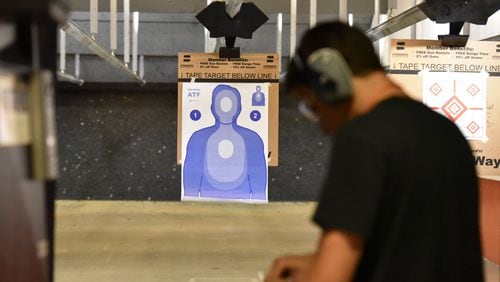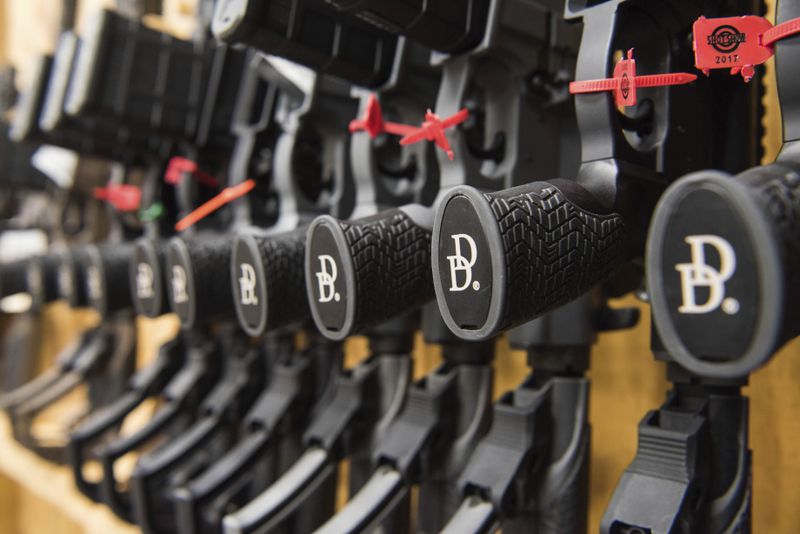An outsize American flag flies above the factory where Daniel Defense makes some of the world’s highest-priced assault rifles.
At NASCAR races, the No. 3 car flashes the Daniel Defense logo.
And when the company’s founder talks about his values, he distills them to three potent words: faith, family, firearms.
Daniel Defense, based in Bryan County, 25 miles northwest of Savannah, is a Georgia success story, one that embodies a culture that often conflates patriotism, religion, regional pride and devotion to the Second Amendment.
But the company, and the culture, came under scrutiny last week after the worst mass shooting in modern U.S. history. Late Sunday night in Las Vegas, 64-year-old Stephen Paddock opened fire on an outdoor music festival from his 32nd-story hotel suite, killing 58 people and wounding nearly 500 before taking his own life. Authorities reportedly found about 20 guns in the hotel suite – including at least four military-style rifles manufactured by Daniel Defense. The rifles appeared prominently in crime-scene photographs by the Las Vegas police.
"Our deepest thoughts and prayers are with the victims and families of the Las Vegas incident," the company said Monday on its Facebook page, its only public statement on the shooting. Company executives did not respond to telephone messages and emails requesting an interview.
In Georgia, no comment will be necessary.
Daniel Defense is one of about 150 firearms manufacturers in Georgia, part of an industry that draws more praise for its economic impact than questions about how its products are used. Twice in the past four years, Gov. Nathan Deal has announced expansions in the work force at Daniel Defense, touting the company’s growth as evidence of Georgia’s “business-friendly environment.”
Firearms restrictions have never been popular in Georgia, regardless of the potential effect on manufacturers. In recent years, mass shootings haven’t inspired gun control measures; they’ve justified making firearms more ubiquitous. Since 2014, state legislators have made it legal to carry guns in bars, in some churches and schools, on college campuses, and in unsecured areas of airports. Next year, lawmakers may authorize guns in state parks.
Many state officials take offense at any suggestion they consider gun regulations in the aftermath of a mass shooting.
“Absolutely disgusting,” Secretary of State Brian Kemp, a Republican candidate for governor, said last week.
“Leftist nonsense,” said another candidate, state Sen. Michael Williams (R-Cumming).
In an interview last week, Deal was asked how Georgia could prevent mass shootings. He steered clear of even mentioning new laws.
“It’s certainly a tragedy and something we’ll probably never truly understand,” he said of the Las Vegas shooting. “But we just hope something like this never happens in our state.”
Credit: Lisa Marie Pane
Credit: Lisa Marie Pane
God, guns, country
Marty Daniel started Daniel Defense more than 15 years ago in Savannah after he couldn’t find the rifle accessories he wanted and ended up designing them himself.
“I owned some AR’s and I really just fell in love with them,” Daniel, 54, said in a video posted on his company’s Facebook page. “What I wanted in an AR was the best one made. I think today that’s where we are.”
Today, Daniel Defense makes weapons for U.S. special forces and for the British military. But mostly it sells high-end semi-automatic rifles to civilians, who pay $2,000 to $3,000 – far more than the $500 to $1,000 that some brands cost. Sales at the privately held company totaled $73 million last year, Daniel told Forbes magazine.
Daniel comes across in interviews as an earnest advocate for the right to bear arms, one whose profit motive runs second to his fervor for the Second Amendment. He says business would have flourished if Hillary Clinton had been elected president, but he backed Donald Trump, anyway.
Daniel has described his company as a “niche” manufacturer that poses no threat to industry leaders. But his profile has grown along with the company’s. Shortly before last November’s election, Trump named Daniel to a gun-rights advisory panel. This year, an affiliate of the National Rifle Association named a Daniel Defense rifle “gun of the year.” The company became the prime sponsor of Richard Childress Racing’s No. 3 car on the NASCAR circuit; it’s the number used for years by Dale Earnhardt, the legendary driver who died in a crash in 2001.
In promoting gun ownership, Daniel and his company often invoke God and country, common sentiments in the firearms industry. On social media, the company recently posted apparent criticisms of professional athletes who kneel during the national anthem, and Daniel told Breitbart News — the nationalist website run by former White House advisor Steve Bannon — he believes the Second Amendment has a divine provenance.
“We are in business, we believe, to be a supporter of the gospel,” Daniel said. “And, therefore, a supporter of the Second Amendment. In other words, not only do we have those Second Amendment rights because God gives them to us, but also the Gospel.”
During a recent interview with Carbon TV, a network that features outdoors programming, Daniel talked about a memorial service in Savannah for Army Rangers who had died in combat. A photograph on display at the event showed the soldiers and their guns.
“They were holding our product,” he said, his voice breaking. He paused to compose himself, then continued: “It’s an honor, and we just appreciate each one of those guys and what they’ve done for our country.”
“There are two types of people in the world,” he added. “There are good people, and there are evil people. Just in case evil people get in charge, good people need to have the ability to fight back.”
Expanding culture
To many Georgians, guns have little to do with good and evil; they're just a part of life, said Jerry Henry, executive director of GeorgiaCarry.org, a gun-rights organization that has successfully pushed the relaxation of firearms restrictions. It wasn't long ago, Henry said, that a kid walking through a small town with a shotgun or rifle might be asked one of two questions: "You going hunting?" or "You been hunting?"
Even in the state’s metropolitan areas, every mass shooting creates a surge in firearms purchases, dealers say, expanding the gun culture into new realms.
Steve Cernek, 51, who manages a greeting-card store in Cumberland Mall, decided to buy a gun after the 2016 shooting in the Pulse, a gay nightclub in Orlando. Forty-nine people died in that attack.
Cernek bought a Heckler & Koch 9 mm handgun and joined the Pink Pistols, a group organized for LGBTQ gun owners. It has 45 chapters across the country.
When he saw what happened inside the Pulse, he said, he decided not to become a victim himself.
If gun sales were restricted, Cernek said, “all the innocent people will be left … with the criminals with the guns.”
“If it can help prevent or lessen the severity of a situation,” he said, “then the better.”
Miguel Zamudio, 24, bought his first gun after his son was born three years ago. Now he carries his Glock every day.
“A lot of things can happen within five to 10 minutes before police come,” Zamudio said. “If someone wants to carjack with my son (inside), I can’t let them do that. … I have to do whatever I as a father need to do.”
He wants Georgia to leave its gun laws as they are.
“Georgia is Georgia, and I’m glad it’s a gun-friendly state,” Zamudio said. “It doesn’t restrict me.”
Jamye Barnes, a 38-year-old interior designer from Decatur, was thinking about buying a gun even before the Las Vegas shooting. She’s single, and some break-ins have been reported in her neighborhood. So last week, as she drove past Stoddard’s Range and Guns in Midtown Atlanta, she decided to stop in.
And yet, she seemed conflicted. She had seen reports that the Las Vegas shooter owned dozens of guns and had bought many of them in recent months. She favors limiting the number of guns a person could buy during a certain time-frame.
“Why would you be able to purchase 33 guns within a year?” she said. “That’s off. But I’m not a gun person, so maybe that’s normal.”
Certainly, to Daniel Defense, it is.
On Sept. 28, three days before police found several Daniel Defense rifles in Stephen Paddock's Las Vegas hotel suite, the company sponsored an informal opinion poll on its Facebook and Twitter accounts. A picture showed a row of the company's assault rifles, lined up on the ground, as if ready to shoot.
The poll’s question: “Can you have too many?”
Staff writers Greg Bluestein, Jeremy Redmon, Becca Godwin, Kristina Torres, Ben Brasch and Mitchell Northam contributed to this article.
About the Author








